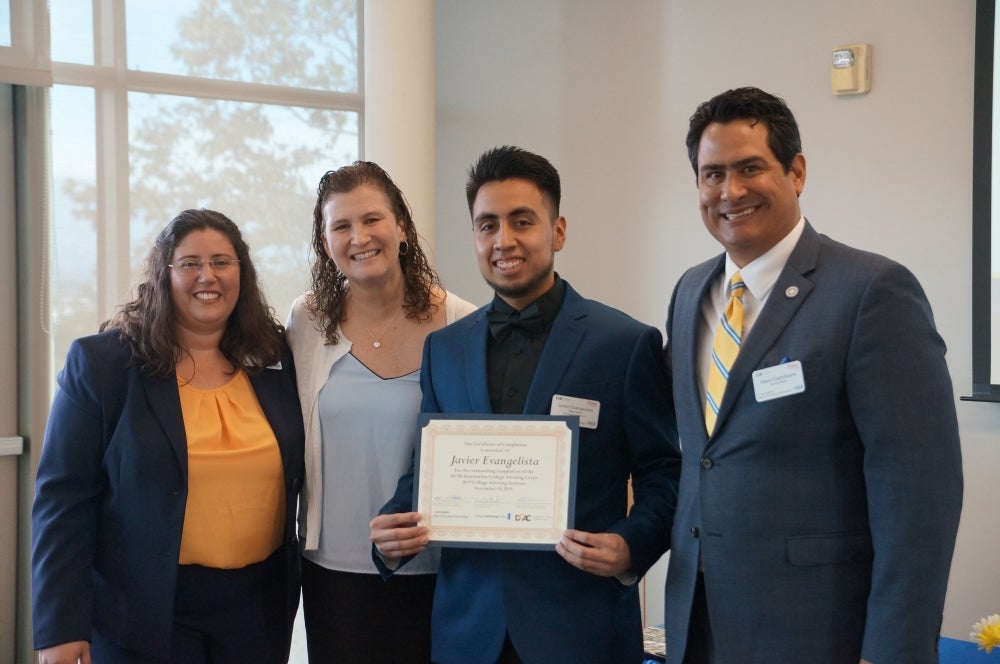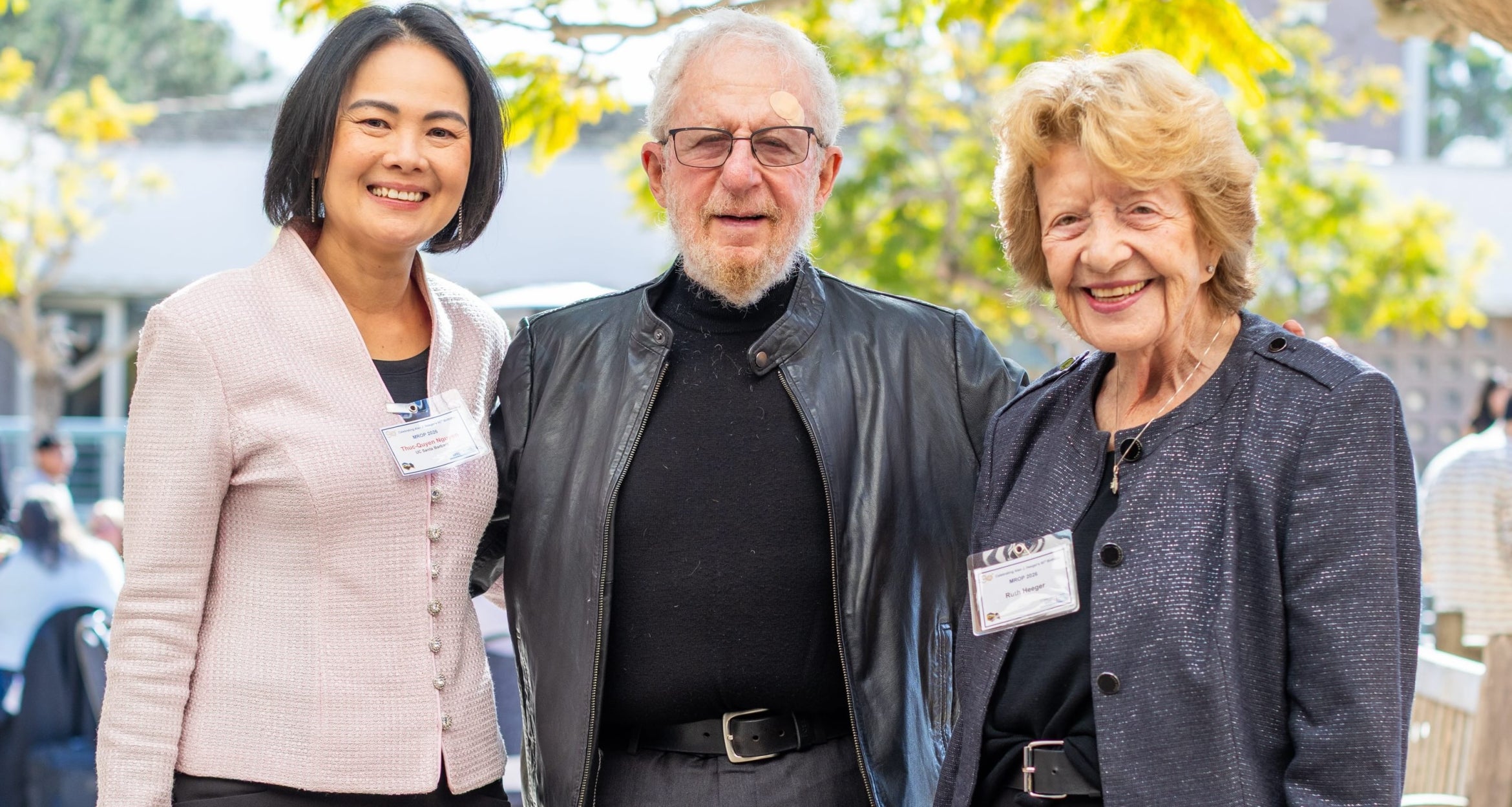
Helping Hands
Who better to guide aspiring college students on their path toward higher education than someone who has recently made that journey himself?
Consider Javier Evangelista. Growing up a first-generation Mexican American in Boyle Heights, a low-income neighborhood in Los Angeles, he had a rocky transition to college, he said, because he hadn’t yet learned “the importance of developing yourself.”
Now an alumnus of UC Santa Barbara working as a college adviser at Rio Mesa High School in Oxnard, Evangelista makes a priority of talking to students about “developing habits such as self-care and time management right now as opposed to later. Being a student in college does not automatically give you these skills.
“Every campus is a platform offering you different opportunities,” he said, “and it is up to you to take advantage of those opportunities in order to produce the success that you want in your life.”
Who better indeed.
Aiming to open the doors of higher education for more low-income, first-generation and underrepresented students, UC Santa Barbara has now launched Destination College Advising Corps (DCAC), placing recent college graduates — Evangelista among them — in underserved public high schools to work as full-time college advisers.
Run through the Office of Education Partnerships (OEP), the program joins UCSB with 31 other universities, across 17 states, in partnership with the national College Advising Corps and UC Berkeley’s DCAC. Starting this fall, UCSB has five advisers working in five Central Coast high schools: Carpinteria High School (Carpinteria Unified School District), Adolfo Camarillo, Oxnard and Rio Mesa High Schools (Oxnard Union High School District), and Santa Paula High School (Santa Paula Unified School District). Their charge: to change perceptions about higher education and to help high school students apply for and enroll in postsecondary institutions that match their goals.
“We are excited to bring the DCAC Program to five UC Santa Barbara partner high schools in academic year 2019-2020,” said Mario Castellanos, executive director of OEP. “This was made possible through teamwork and through leadership of school district partners, school site administrators and counseling staff and though our UCSB academic preparation program staff in both MESA and EAOP.”
Added Micaela Morgan, K-12 programs director for OEP, “Our drive to bring on DCAC was to provide additional support to our MESA program as DCAC is meant to offer more targeted college readiness support with greater frequency. The purpose of DCAC is two pronged, to both empower high school students to excel academically and apply to college and to train post-baccalaureates, who are near peers and first-generation college graduates, to become skilled college preparation professionals who will go on to pursue graduate school and become leaders in the education field.”
As high school students work toward higher education, DCAC college advisers provide assistance in everything from registering for the SAT and ACT exams, to applying for financial aid and scholarships, to completing college applications. And whether it’s a trade school students want to attend or a four-year institution like UC Santa Barbara, the advisers aim to help them identify the best educational opportunities for their goals.
At Oxnard High School, DCAC college adviser Oscar Cisneros provides students with college readiness and academic content, with a particular focus on the college admission process for four-year institutions. Those efforts will soon include meeting with students at all grade levels, “providing much-needed support for our students and keeps other adults continually focused on it as well,” said Principal Richard Urias.
“He also brings current information and strategies based on his experience and DCAC training,” Urias added of Cisneros. “Oscar’s background and experiences really resonate with our students. He is able to use his own experiences to provide wisdom and motivation to our students, to let them know there is a pathway for them to college.”
Across CAC’s entire network of advisers, 80% of them are themselves Pell grant recipients, first-generation college graduates or underrepresented minorities. By working in the program, they are growing as leaders while using insights and wisdom from their own experiences in higher education to benefit younger students coming up behind them.
It’s a win-win-win, for high schools, for students and for advisers alike.
“We are excited that the DCAC College Advisers will start their professional journey at UCSB’s Office of Education Partnerships,” Castellanos said of the DCAC advisers. “They have already received valuable workforce training, critical professional development, and are continuing to explore their individual graduate and career pathways. We are especially excited about connecting our advisers to the Gevirtz Graduate School of Education, where we hope they will expand their leadership development in K12 and/or higher education.
“We are very grateful to our UC Berkeley colleagues for sharing their years of experience and for fine tuning the DCAC model in California,” he added. “We are equally grateful to the College Advising Corps Foundation for developing the innovative program nationally, for their capacity building and for their financial support. Finally, we are also thankful to the UCOP Office of Diversity and Engagement for supporting the expansion of the DCAC Program to UC Santa Barbara.”



